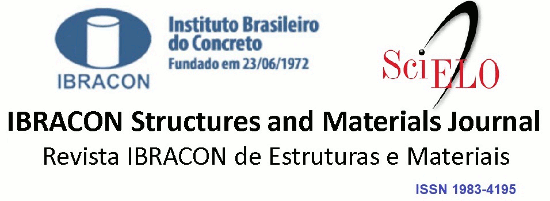ABSTRACT:
Sulfate attack is a term used to describe a series of chemical reactions between sulfate ions and hydrated compounds of the hardened cement paste. The present study aims to evaluate the physical (linear expansion, flexural and compressive strength) and mineralogical properties (X-ray diffraction) of three different mortar compositions (Portland Cement CPV-ARI containing silica fume and rice husk ash, in both cases with 10% replacement of the cement by weight) against sodium and magnesium sulfate attack (concentration of SO42- equal to 0.7 molar). The data collected indicate that the replacing the cement by the two siliceous supplementary cementitious materials (SCMs) generate similar results, both SCMs were able to mitigate the effects of the sodium sulfate attack in both physical and chemical characteristics, however, both materials increase the deterioration (i.e. compressive strength) when exposed to MgSO4 solution.
Keywords:
durability; sulfate attack; sodium sulfate; magnesium sulfate

 Thumbnail
Thumbnail
 Thumbnail
Thumbnail
 Thumbnail
Thumbnail
 Thumbnail
Thumbnail
 Thumbnail
Thumbnail
 Thumbnail
Thumbnail
 Thumbnail
Thumbnail
 Thumbnail
Thumbnail
 Thumbnail
Thumbnail
 Thumbnail
Thumbnail
 Thumbnail
Thumbnail
 Thumbnail
Thumbnail
 Thumbnail
Thumbnail
 Thumbnail
Thumbnail
 Thumbnail
Thumbnail
 Thumbnail
Thumbnail















